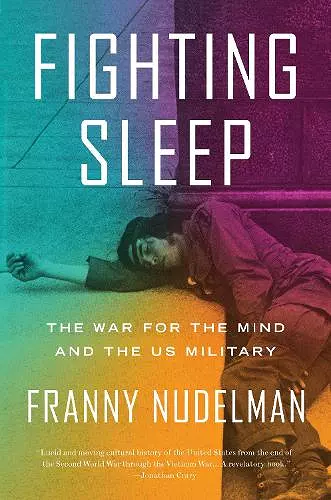Fighting Sleep
The War for the Mind and the US Military
Format:Hardback
Publisher:Verso Books
Published:8th Oct '19
Should be back in stock very soon

How sleep has been used by the military-and how soldiers have fought back
How the military used sleep as a weapon-and how soldiers fought backOn April 21, 1971, hundreds of Vietnam veterans fell asleep on the National Mall, wondering whether they would be arrested by daybreak. Veterans had fought the courts for the right to sleep in public while demonstrating against the war. When the Supreme Court denied their petition, they decided to break the law and turned sleep into a form of direct action.
During and after the Second World War, military psychiatrists used sleep therapies to treat an epidemic of "combat fatigue." Inducing deep and twilight sleep in clinical settings, they studied the effects of war violence on the mind and developed the techniques of brainwashing that would weaponize both memory and sleep. In the Vietnam War era, radical veterans reclaimed the authority to interpret their own traumatic symptoms-nightmares, flashbacks, insomnia-and pioneered new methods of protest.
In Fighting Sleep, Franny Nudelman recounts the struggle over sleep in the postwar world, revealing that sleep was instrumental to the development of military science, professional psychiatry, and antiwar activism. Traversing the fields of military and mainstream psychiatry, popular and institutional film, documentary sound technology, brain warfare, and postwar social movements, she demonstrates that sleep-far from being passive, empty, or null-is a site of contention and a source of political agency.
Praise for John Brown's Body: Slavery, Violence, and the Culture of War:
"John Brown's Body explains the enormous role of Brown's martyrdom in the visual and literary rhetoric of the Civil War" -- Adam Gopnik * The New Yorker *
Praise for John Brown's Body: Slavery, Violence, and the Culture of War:
John Brown's Body critiques the long-held idea, from Richard Slotkin forward, that violence must be the price of profound social change -- Jane E. Schultz * The Journal of American History *
Praise for John Brown's Body: Slavery, Violence, and the Culture of War:
John Brown's Body is a cultural history of great originality and depth. By interweaving histories and literatures that have often been kept separate, it sheds new light on the meaning of the devastation of the Civil War and, more generally, on violence as a form of cultural expression. -- Karen Flood * The North Carolina Historical Review *
Sleep seems to mark a realm wholly separate from public affairs, but Sleeping Soldiers reveals its methodical colonization by the US national security state and its surprising centrality to Cold War American politics and culture. Moving deftly between film and public protest, military psychiatry and veteran experience, documentation and reality, Franny Nudelman charts a fascinating pathway from the CIA mind-control experiments and the "brainwashing" scare of the Korean War era to the troubled sleep of the traumatized veteran, the endless wakefulness of the POW, and the emergence of a veteran's movement focused on the right to sleep in public. -- Timothy Melley, author of The Covert Sphere: Secrecy, Fiction, and the National Security State (Cornell 2012), Professor of English and Director of the Miami University Humanities Center.
In this lucid and moving cultural history of the US from the end of WW2 through the Vietnam War, Franny Nudelman explores the problematic status of sleep for soldiers damaged by the trauma of warfare. Writing against the instrumental logic of sleep as the recuperation necessary for a return to service and combat, she poses the passivity and vulnerability of sleep as an interval of refusal, of healing, or of oblivion in relation to the imperatives of a militaristic society. A revelatory book. -- Jonathan Crary, Author of 24/7: Late Capitalism and the Ends of Sleep
If you've never thought of sleep as direct action, Franny Nudelman's marvelous tale of the struggles over soldiers' sleep will awaken you to the mundane tactics of peaceable assembly in the face of the nightmares of militarism. A riveting re-imagination of antiwar activism for our post-traumatic times. -- Michael Denning, author of Noise Uprising and The Cultural Front
[Insurgent Empire] sets out to celebrate the political agency of colonised peoples, its importance in bringing an end to empire and the impact it had on metropolitan liberal and radical thinking. -- Matthew Reisz * Times Higher Education *
Haunting and lovingly researched. -- Benjamin Reiss * Los Angeles Review of Books *
Fighting Sleep shows that interpreting trauma by ourselves is vital to resisting the violence committed in our names. In a world of war, inequality, repression, and environmental degradation, we must explore our discomfort and question our role in this violence. -- Joey Mitchell * Mobilization *
ISBN: 9781786637819
Dimensions: 210mm x 140mm x 16mm
Weight: 265g
160 pages